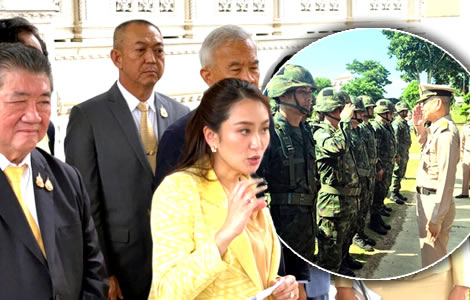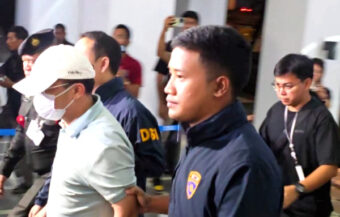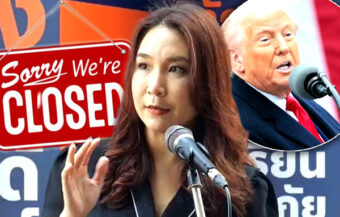PM Paetongtarn acts fast to quell Ko Kood rumours amid rising nationalist outrage. In urgent talks, the Thai leader addresses public fears over a 23-year-old MOU with Cambodia concerning disputed maritime claims and the sovereignty of the tourist hotspot island.
Thai Prime Minister Paetongtarn Shinawatra on Monday pulled out all the stops to counter a campaign of rumour and misinformation being spread in relation to the remote island of Ko Kood in the Gulf of Thailand. The PM and Ministry of Foreign Affairs both gave briefings at the same time as a high-level meeting was convened at Government House.

In brief, a political campaign is afoot to stir up national feelings over a 23-year-old Memorandum of Understanding (MOU) between Cambodia and Thailand signed in 2001. At length, the document, which has been approved by the Thai parliament, is meant to be a discussion paper between the two countries. In short, its goal is to resolve overlapping maritime resource claims in the Gulf of Thailand.
In particular, it concerns at least $300 billion worth of oil and gas reserves believed to be located in the area.
Nonetheless, the fears being expressed are over the small tourist island of Ko Kood, which was awarded to Thailand in 1907 but which, in the 1960s, was claimed by Cambodia.
Ko Kood becomes a focal point in rising political tensions and nationalism in Thailand today
The tiny island of Ko Kood in the Gulf of Thailand, approximately 400 km south of Bangkok, finds itself at the heart of Thai politics.
In short, the matter is being pursued by the Palang Pracharat Party, recently sidelined from the government after Prime Minister Paetongtarn Shinawatra came to power.
Indeed, the former ruling party’s deputy leader, Paiboon Nititawan, in September had a court challenge to the controversial Memorandum of Understanding (MOU) between Cambodia and Thailand dismissed by the Constitutional Court in a 6-3 judgement.
In effect, this represents a political challenge to former Prime Minister Thaksin Shinawatra, who negotiated the deal with Cambodia back then.
Both countries are understood to be sitting on at least $300 billion worth of energy reserves. Certainly, the Memorandum of Understanding (MOU) was essentially the basis for discussion on these reserves and resources within the area.
At length, there is an overlapping claim. However, a maritime map linked with the documents, designed to serve as the basis of the agreement, has upset Thai nationalists. In short, they feel it may undermine Thailand’s sovereignty over Ko Kood island.
Ko Kood’s historical significance fuels nationalistic sentiments and protests against the government
The island is part of the Ko Kood district, which is part of Trat province in the south, located in the eastern Gulf of Thailand. The island has a population of approximately three thousand and is 162 square km in size.
Formerly, it was an active trading post, but presently it is a tourist attraction for travellers seeking a quiet location or a “paradise island.”
The island has a number of coconut plantations and idyllic seaside villages. In the 1960s, there were claims to the island expressed by Cambodia.
However, under the Franco-Siam Treaty of 1907, the territory was recognized as part of what was then Siam. Nevertheless, the issue is becoming a heated one among some alarmed Thai nationalists.
Already, there are calls for protests and claims that the Shinawatra-led government may be putting the sovereignty of the island in play.
Certainly, on Monday, Prime Minister Paetongtarn Shinawatra slammed such claims. Ms. Paetongtarn asserted that she is fully Thai and that her government is working to protect the country’s sovereignty and land.
Navy chief visits Ko Kood amid rising tensions over sovereignty and political unrest in Thailand
However, the unease surrounding the controversy prompted a visit to the island by Royal Thai Navy Chief Admiral Jirapol Wongwit over the weekend.
At length, he inspected the naval base there and, in particular, communications with the mainland. He also underlined the navy’s commitment to protect Thailand’s sovereignty and land.
The challenge facing Ms. Paetongtarn is that this is a political campaign. In short, it is being pushed by forces unknown to generate another basis to launch street protests against the Prime Minister and her father in the new year.
Certainly, any threat to Thailand’s sovereignty or territory can quickly translate into protests on the streets in Thailand. In effect, this will fuel invective against the government.
In particular, it comes as the Election Commission is assessing claims against Mr. Thaksin Shinawatra’s influence over the new government.
At the same time, a campaign is being pushed by the National Anti-Corruption Commission (NACC), investigating Mr. Thaksin’s treatment while a prisoner after his return to Thailand in 2023.
Controversial former premier Thaksin Shinawatra targeted by political divide in Thailand today
At length, the controversial former premier, either a well-loved or despised figure depending on the political divide, is being targeted.
In short, he easily galvanises street protest movements. In relation to Ko Kood, Mr. Thaksin’s close friendship with Cambodia’s de facto strongman and ruler Hun Sen is the goal of this campaign.
At length, on Monday, both PM Paetongtarn and the Ministry of Foreign Affairs attempted to diffuse concerns and communicate with the public. The 2001 Memorandum of Understanding (MOU) is known as Memorandum of Understanding (MOU) 44 or MOU44.
In a significant meeting at Government House today, Thailand’s Prime Minister, Ms. Paetongtarn Shinawatra, discussed the matter with coalition leaders.
The PM dealt head-on and addressed public concerns surrounding MOU 44. Ms. Paetongtarn afterwards reassured the citizens of Ko Kood.
She declared succinctly that the Thai island near the Cambodian border remains unaffected by this memorandum.
She emphasised her government’s commitment to protecting Thailand’s sovereignty. At the same time, she underlined a peaceful approach to ongoing negotiations with Cambodia.
Key government leaders hold crucial discussions regarding MOU 44 and public perceptions in Thailand
Held in the Green Room of the Thai Khu Fah Building, the meeting included several key government figures, such as Deputy Prime Ministers Phumtham Vejjayachai and Anutin Charnvirakul, as well as Minister of Natural Resources Mr. Chalermchai Sri-on.
The latter is also the leader of the Democrat Party.
These leaders discussed issues related to MOU 44 and the growing public misunderstandings about its connection to Ko Kood. The meeting lasted nearly two hours, after which the Prime Minister addressed the press.
Ms. Paetongtarn’s statement aimed to calm public concerns. She stressed that “Thailand must come first” and vowed that the government would “protect our territory fully and ensure the people’s peace of mind.”
Ko Kood, she said, remains under Thai sovereignty, grounded in the historical Siam-France Treaty, which confirms Thai ownership. This treaty, signed with France, delineates Thailand’s borders in the region—a boundary Cambodia respects.
PM Paetongtarn Shinawatra’s government already assailed by a street protest movement at the gates
Pressure mounts again on PM Paetongtarn as the Constitutional Court seeks AG’s input on complaint
The Prime Minister clarified that MOU 44 is an agreement to manage overlapping maritime claims between Thailand and Cambodia.
However, she stated firmly, “This MOU has no connection to Ko Kood. The island has never been part of these negotiations.” Instead, the MOU outlines a framework for joint discussions on shared maritime resources without conceding Thai territory.
Prime Minister outlines the importance of mutual consent to annul MOU 44 amid rising public concern
Addressing calls to cancel MOU 44, Ms. Paetongtarn explained that the agreement can only be annulled by mutual consent. Should Thailand cancel unilaterally, the country could face legal repercussions.
In brief, this would not be in its best interest. The MOU, established in 2001, allows both nations to dialogue and avoid actions that could escalate tensions.
Thailand’s Ministry of Foreign Affairs reiterated the importance of MOU 44 in managing shared claims in the Gulf of Thailand.
Mr. Nikorndej Plangoon, the ministry’s spokesperson, provided further background. At length, he noted that the agreement offers a structured approach to overlapping claims.
This approach respects international laws, particularly the United Nations Convention on the Law of the Sea. At the same time, it ensures both countries’ rights in negotiating maritime boundaries.
Later, a briefing was given by the Ministry of Foreign Affairs in Bangkok.
Ms. Suphannawasa Chotikayan Tang, Director-General of the Department of Treaties and Laws, explained that MOU 44 is for cooperation, not an endorsement of Cambodia’s claims.
Key issues in negotiations focus on undersea petroleum resources in the contested area near Ko Kood
“One core issue in negotiations is the undersea petroleum resources in the contested area.” Ms. Paetongtarn confirmed Thailand’s intention to form a new joint committee to oversee discussions on resource-sharing.
This committee will include representatives from key ministries such as Defense, Foreign Affairs, and Energy. Together, these agencies will explore fair resource distribution options to benefit both nations.
To reinforce Thailand’s stance, Ms. Paetongtarn emphasised reason and diplomacy.
“Cancelling the MOU will only lead to lawsuits, which is unnecessary. All parties need to understand the principle and avoid escalation,” she said. Thailand’s priority, she added, is to ensure mutual respect and peaceful dialogue with Cambodia.
The Ministry of Foreign Affairs confirmed that the Joint Technical Committee (JTC) will advance discussions on the Overlapping Claims Area (OCA).
Comprising around 20 experts, the JTC will be led by the Deputy Prime Minister for security. Once representatives from Thailand and Cambodia finalise their committee members, formal negotiations will commence under the MOU’s guidelines.
Prime Minister emphasises the need for logic and transparency in managing Thailand’s territorial disputes
During the briefing, Ms. Paetongtarn responded to concerns from some groups that view the MOU as conceding to Cambodia’s maritime claims.
She refuted this, emphasising that MOU 44 is solely a mechanism to manage disputes. “We need to approach this matter with logic and transparency,” she stressed, highlighting the importance of public understanding for stability.
The Thai government and the Ministry of Foreign Affairs have called for patience and caution in evaluating the MOU.
In closing, Ms. Paetongtarn remarked that ongoing efforts in cooperation and dialogue between the two nations remain paramount. Ultimately, fostering goodwill and understanding is crucial for resolving these complex issues surrounding the development of valuable enenrgy resources.
Join the Thai News forum, follow Thai Examiner on Facebook here
Receive all our stories as they come out on Telegram here
Follow Thai Examiner here
Further reading:
Pressure mounts again on PM Paetongtarn as the Constitutional Court seeks AG’s input on complaint
Ung Ing papers over the cracks of a cabinet which is already divided after only six weeks in office
Firebrand Jatuporn launches crusade against Thaksin Shinawatra and present government in Bangkok
Political storm brewing as the country’s leading parties struggle to reform the 2017 Constitution
Prime Minister Paetongtarn is the people’s favourite for the top job according to latest NIDA poll
Government is already divided as the PM shelves efforts at amending the 2017 Constitution on ethics
People’s Party on campaign but on guard against potential legal complaints to oversight agencies
Wealthy young People’s Party leader aims to create a technology-driven and efficient welfare state
Inward immigration may ultimately be the only thing that can halt Thailand’s fated economic decline


















